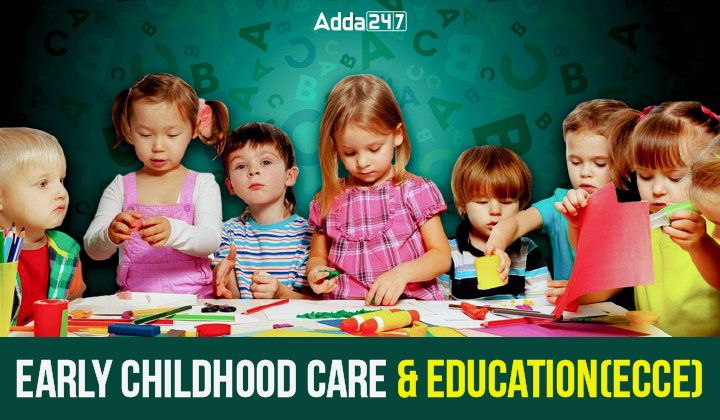Table of Contents
Early Childhood Care and Education (ECCE) refers to the holistic support and educational programs provided to young children, typically from birth to around eight years of age. ECCE focuses on the development and well-being of children during their crucial early years, laying the foundation for their lifelong learning, socialization, and overall development. ECCE encompasses a range of services and interventions that aim to address the physical, cognitive, emotional, and social needs of young children.
ECCE Objective
Every child in the range of 3 – 6 years has access to free, safe, high quality, developmentally appropriate care and education by 2025.
ECCE Background
- 85% of brain development occurs during first six years of life.
- Caring and stimulating environment crucial for holistic development.
- There is relationship between attending a quality Pre – School and achievement in primary classes and beyond.
- Direct correlation with retention rates, attendance rates and learning outcomes
- Studies demonstrate that children who start out behind tend to stay behind throughout their school years.
- In terms of growth of National economy Re. 1/ – invested in ECCE can give return of Rs. 10/.
- Age group for ECCE is 0 – 8 years :
- 0 – 3 years, with focus on health, nutrition of mother and the child.
- 3 – 8 years, focus on health, nutrition, self help skills, school readiness and play and activity based education
ECCE Present Scenario
- Large proportion of children not receiving developmentally appropriate education.
- Severe learning crisis – children fail to acquire basic skills in foundational literacy and numeracy
- Present setup of ‘Anganwadis’ is deficient in supplies and infrastructure for education.
- Private bodies/NGOs provide Pre – School education which is downward extension of primary classes.
- High teacher – pupil ratio, lack of developmentally appropriate infrastructure, inappropriate learning methods, rote memorization and untrained staff are common challenges.
- Limited on the health aspect
How To Deliver Quality ECCE (Early Childhood Care and Education) Programme?
- ECCE should be included as an integral part of the RTE Act.
- Government to providing free Pre – School education for all children until age of six years
- Target of Early Childhood Education (ECE) for all by 2025
- NCERT to develop integrated Curricular.
- The frame work will consist of two parts :
- 0 – 3 years – intended for parents, Anganwadi workers and teachers with focus on health and nutrition of mother & child and cognitive and emotional stimulation of the child.
- 3 – 8 years – This stage will cold ‘Foundational stage (age groups 3 – 6 and 6 – 8).
- Role of parents and community to be integrated.
- Thrust on significant expansion and strengthening of facilities for early childhood education via four pronged approach
- strengthening and expansion of the Anganwadi system
- Co – locating Anganwadis with Primary Schools
- Co – locating Pre – Schools with Primary Schools (supported by health, nutrition and growth monitoring)
- Building stand alone pre – schools in areas where Anganwadis and Pre – Schools are not available.
- All Anganwadi centers and Pre – Primary Schools will be linked to a Primary School.
- Developing learner – friendly environment for conducive atmosphere of learning in Anganwadis, Pre – Schools and Primary Schools.
- High quality Teacher Educators for ECCE
- Special six month training for Anganwadi workers.
- Instituting a quality regulatory system for ECCE.
- Socio – economically/marginalized districts to be given priority.
- ECE will come under the purview of MHRD to ensure continuity of curriculum and pedagogy from Pre – Primary stage to Primary Stage.
- A detailed plan outlining the operational and financial implications of integration of ECE with school education system will be developed in consultation with the MWCD and MHFW. This plan will be finalized by the end of 2019 by a special task force jointly constituted by the MWCD, MHFW and MHRD.
ECCE Policy
Early Childhood Care and Education (ECCE) refers to programmes and provisions for children from prenatal to six years of age, which cater to needs of a child in all domains of development i.e. physical, motor, language, cognitive, socio – emotional, and creative and aesthetic appreciation; and ensure synergy with health and nutrition aspects. This would cover developmental priorities for each substage within the continuum, i.e. care, early stimulation/interaction needs for children below 3 years, and developmentally appropriate preschool education for 3 to 6 year olds with a more structured and planned school readiness component for 5 to 6 year olds.
This policy is thus applicable to all early childhood care and education programmes/ related services in public, private and voluntary sectors in all settings across regions, that are offered to children under 6 years. These services could go by the nomenclature of Anganwadis (AWC), crèches, play groups/schools, preschools, nursery schools, kindergartens, preparatory schools, balwadis, home based care etc. and propose to cater to the needs of children from prenatal to six years.
ECCE Policy Vision
The Vision of the policy is to promote inclusive, equitable and contextualised opportunities for promoting optimal development and active learning capacity of all children below 6 years of age. It envisages to improve pathways for a successful and smooth transition from care and education provided at home to centre based ECCE and thereafter to school – age provision by facilitating an enabling environment through appropriate systems, processes and provisions across the country.
In furtherance of the vision of the policy, the government shall be guided by the following objectives :
- Facilitating comprehensive childcare supports, infrastructure and services aimed at holistic well – being of children and responsive to their developmental needs.
- Ensure adaptive strategies for inclusion of all children.
- Build human resource capacity of ECCE across sectors to enhance and develop quality services for children and their families.
- Set out the quality, standards and curriculum framework for ECCE provisions and ensure their application and practice through advocacy and enforcement.
- Raise awareness and understanding about the significance of ECCE and promote strong partnerships with communities and families in order to improve the quality of life of young children through institutional, programmatic and technological means.
Early Childhood Care and Education (ECCE) PDF Notes
Candidates preparing for Teaching Exams can easily access the Phases of Teaching – Stages of Teaching Process Notes PDF file from the link provided below. They can refer to the PDF as a reference during preparation and most importantly during revisions.
Download Early Childhood Care and Education Study Notes PDF




 UGC NET Study Notes for Paper 1, Downloa...
UGC NET Study Notes for Paper 1, Downloa...
 GSET Teaching Aptitude Questions and Ans...
GSET Teaching Aptitude Questions and Ans...
 समुद्र का पर्य�...
समुद्र का पर्य�...












